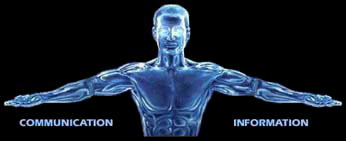Introduction
We encourage you to verify the source images for yourself, rather than just simply accept the facts that are presented here.
Exact details of the used image templates can be found here.
Some reports on this website are based on previous ones. So it is extremely important to read the reports in chronological order.
Details can turn up that were probably already been analyzed in detail. If you are new here and you directly start reading the
recent reports without prior knowledge, then it could happen, that the required context is not recognizable.
You do yourself and us a favor when you first start with the oldest reports.
This is the third analysis report regarding Aram Chaos. We recommend that you first review the previous reports,
if you have not read them yet.
These include the following documents:
Target Area
Image Source: Mars Global Surveyor
Labeling: MOC image R22-00155
Coordinates: 3.11 Nord / 340.53 Ost
Target Area: Eastern terrain of Aram Chaos
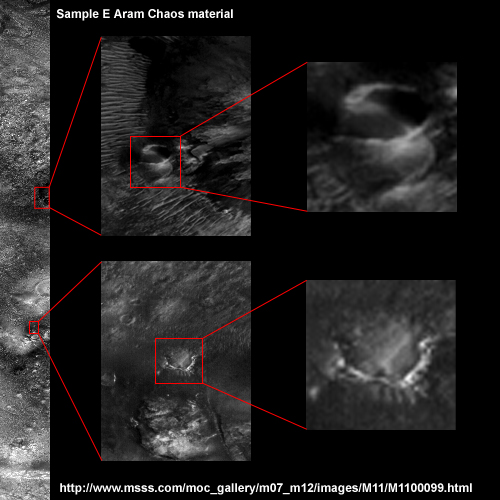
Enlargement of the relevant target area from the original photo strips
General View
Marking of the relevant structures
(The corresponding image section was rotated by 180 degrees and flipped horizontally)
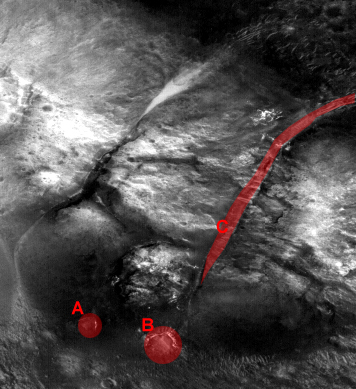
On closer examination the photo strip R22-00155 shows up so many eye-catching structures that you can not count them anymore.
However, only a few of these structures can be resonably explained. At least three new
aspects with relation to the ATLAS station we want to show.
The Entrances into the ATLAS Station
Mark A on the overall view shows another entrance, which was previously overlooked. This one is roughly half the
size of the "main" entrance. The narrow viewing angle into it allows no further conclusions about the road layout.
However, it seems that there is an object in the driveway, yet more details are not recognizable.
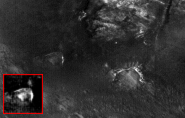
The main entrance to the ATLAS station (in the general view marked with B) has already been described in the
previous report.
However, there is still something to be noted about this opening. After re-examination it was noticed that the
driveway leads not just into the dome-like structure. Just on the first few meters the road splits into two roads.
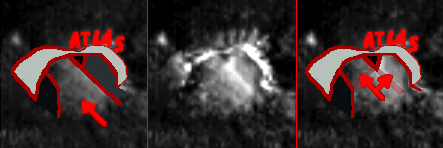
The middle part of the picture strip shows up a contrast-enhanced representation of the driveway. To the
left the road layout was graphically highlighted, as it has been seen in previous image analysis. The
right image strip shows the result of the newly performed image analysis. One can see in the driveway a little
area in the form of a small black triangle. This was initially interpreted as a segment of a darker wall,
In fact, this area marks the separation of two roads, which lead directly into the facility.
A Route Along the ATLAS Station
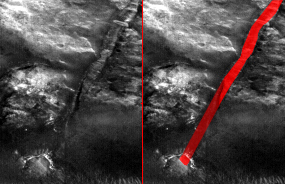
It can only be speculated on how the road layout within the ATLAS facility looks like. However, there is a
feature that attracts our attention. This one is marked here with C in the general view of the ATLAS
facility. In the first instance it was not clear what it was. But with the newly discovered road layout,
which emerges in the driveway, finally this structure makes sense now. The alignment of the road as
it can be seen in the driveway, and the orientation of the long covered structure C shows up a connection
to each other. In this context structure C is therefore a street that leads from the driveway up to the top
right of the photo cutout. Cause this part is open and not covered, we can see the roadway arrangement.
An other part of the road leads into the facility and perhaps into a system of tunnels.
It would be interesting to see where this road leads to, which continues outside the frame. Such images
are however not available. Over the years, the Mars Global Surveyor spacecraft made images of several areas
in Aram Chaos. However, these are not comprehensive. A large part of Aram Chaos remains undocumented.
By end of 2006, the contact with the probe stopped, so the source dried up here. It remains to be seen whether other
Mars probes capture that area in high-resolution.
Conspicuous Features of Structure C - A Mythological Creature?
In the immediate vicinity of the facility, which we here call the ATLAS station, there is another
elevation, which at first appears quite unobtrusively. Because this elevation shows up a relatively well-proportioned
appearance, one might expect that this one is a further facility in the surroundings of large technical facilities.
At the first glance no entrance can be found. However, on closer inspection this elevation shows a small darkened area,
which reveals amazing details in the enlarged view.
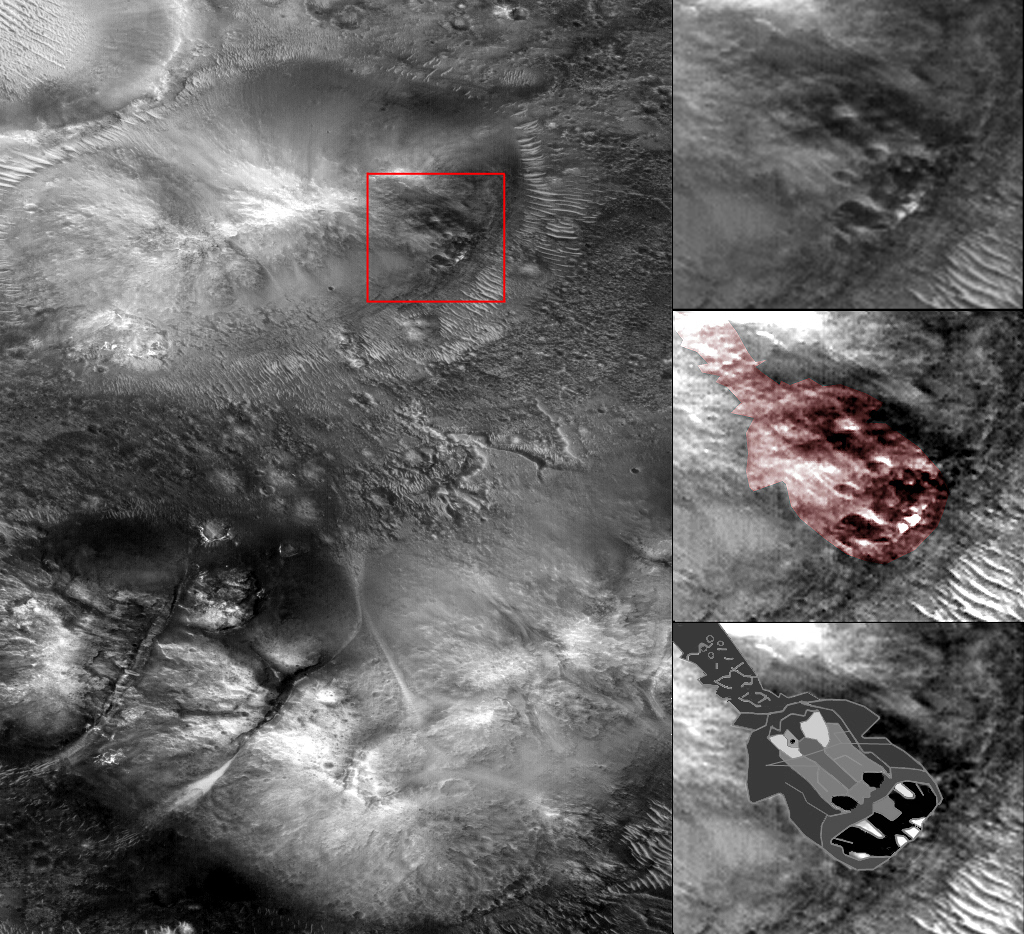
Click on image to enlarge
Not every observer of our analsis team has directly identified the form of a head within this structure. By
graphical enhancements of the shaping a more plastic representation can be achieved in order
to support recognition processes of the brain. With such imaging techniques, however, skepticism should be
maintained, since nature shows many examples where rock formations create the association of persons
or faces.
At this point simple image editing programs like Microsoft Paint are no longer sufficient for complex reconstruction works.
Important here are options to change contrast and brightness to arbitary values and to calibrate any
zoom factors to selectively highlight individual pixels. For more sophisticated picture processing we may recommend tools
like Photoshop or Gimp.
Is this dragon-like structure an example of natural shope forming or is this the result of an artificial influence?
A measure of artificiality would include a high degree of symmetry. The present structures show very balanced
forms by which a meaningful allocation of facial features would be possible. This is true for the mouth, the arrangement
of the teeth (including the prominent upper incisors), the tongue, the nostrils, the nose, eyes, cheeks, and forehead.
In addition to this, the formation appears to further continue behind the head in a shape of a snake or a dragon.
Apart from the symmetry is the meaning. Is a meaning perceptible in such a structure? The mouth opening has
about the same size of the entrance into the ATLAS station. It would be a possible entrance into this structure.
An underground connection between the individual facilities would also be feasible. However,
we want to try to rely on visually verifiable facts. The bottom teeth row would possibly prevent
the driveway for larger vehicle, but the sides seem to be large enough to slip through.
Similarly, the mouth is located at the foot of this mound and reinforces the possibility of an entrance. But makes
it sense to build an entrance in the form of a giant dragon head? And why is it a dragon head?
Admittedly, the reconstruction of the dragon head describes only a part of the structural anomaly of this mound.
Further details attracts attention, if you're looking along the mound.
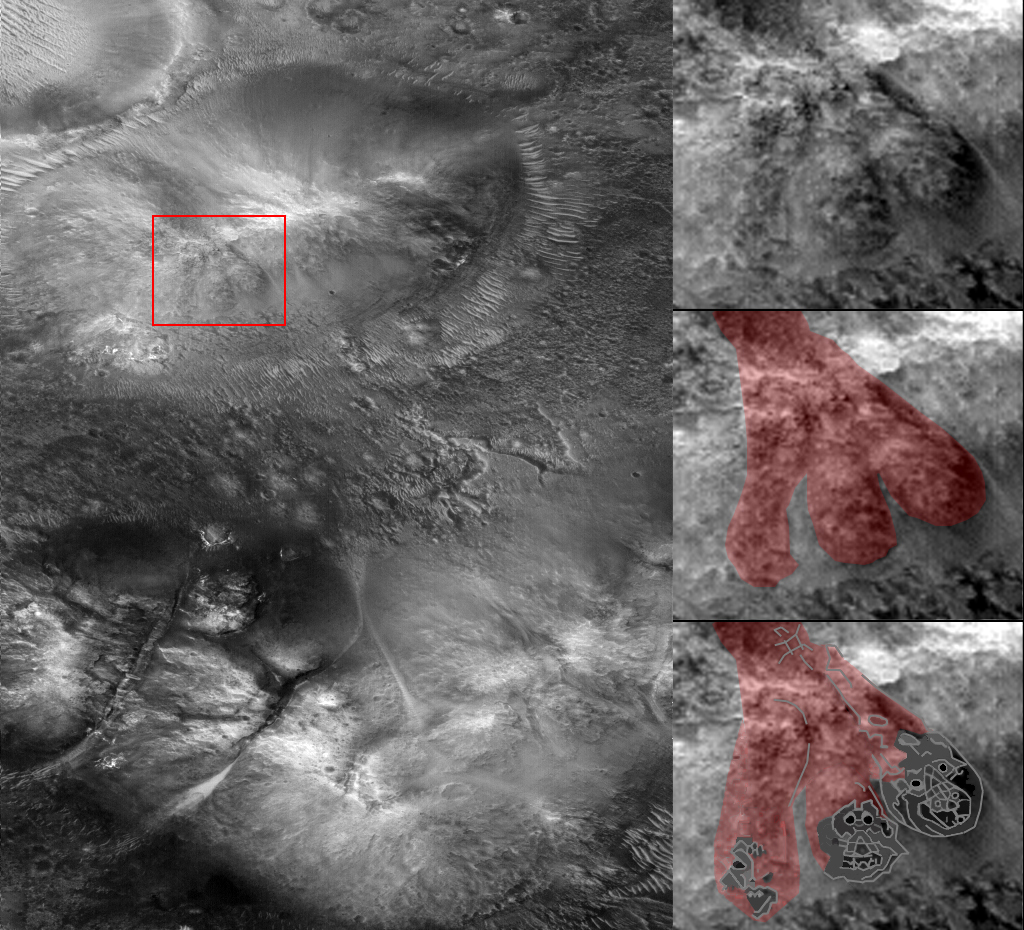
Click on image to enlarge
A structure is visible that differs from that of the environment through small elevations and a darker color.
There are three streams which seem to unite backwards into one strand. The first association is,
in consideration of the large dragon head that there are other head-like structures here. The shape appears to be of a snake, and
actually the magnification contours reveals biological attributes such as eyes, nostrils, mouth and
scales-like structures can be assigned.
The reconstruction of this part of the monument is not as easy as of the large dragon head. In some cases
parts of the structure seem to be broken. One would think that weathering processes are responsible for this, but the reason
for the breakup is well explained by the fact that the rear middle part of the mound is collapsed. This could well
be so, assuming that the mound had inner cavities or chambers. That in turn suggests that the large dragon head
represents an entrance, as it was previously suggested.
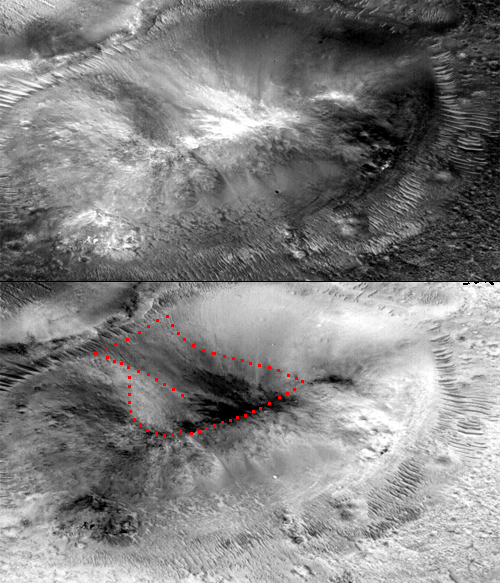
Lower image: Inverted view and marking of the rough edges
As a result of the collapse, practically the entire middle section between the two snake-like figures has been
destroyed. The question comes up, whether the two fragments could have been part of a single figure.
What is body shaped like a snake, has not only a beginning but an end? The tail end should
consequently be situated somewhere in the back of the mound.
An answer why the architectural design of a "dragon" or a multi-headed snake was selected, can only
be given if anything is known about the culture of the builders. If we assume that the builders of these facilites are
of extraterrestrial origin, the shape of a dragon
 ,
however, appears very familiar for our cultural understanding
in terms of our legends and myths. Despite of all evidences uncertainty remains, whether the human
imagination interpreted more into it than actually is there. There have to be
clear indications to justify the existence of a dragon sculpture and this seems to be a difficult task at the moment. ,
however, appears very familiar for our cultural understanding
in terms of our legends and myths. Despite of all evidences uncertainty remains, whether the human
imagination interpreted more into it than actually is there. There have to be
clear indications to justify the existence of a dragon sculpture and this seems to be a difficult task at the moment.
Detail Explained - First Clue to the Builders!
Because the main entrance to the ATLAS station was equipped with quite unmistakably big letters, it was suspected,
that there could possibly be identification markings on other approaches. Another entrance to a prominent structure
in Aram Chaos is the "hollowed-out mountain". In a previous report it was
already determined that the access to this mountain is realized via a large ramp but a caption can not be found above
this driveway. It is also difficult to identify any details on the mountainside. There are
several abnormalities but these are unfortunately not interpretable structures.
What now remained was the ramp itself - and this one provided a big surprise.
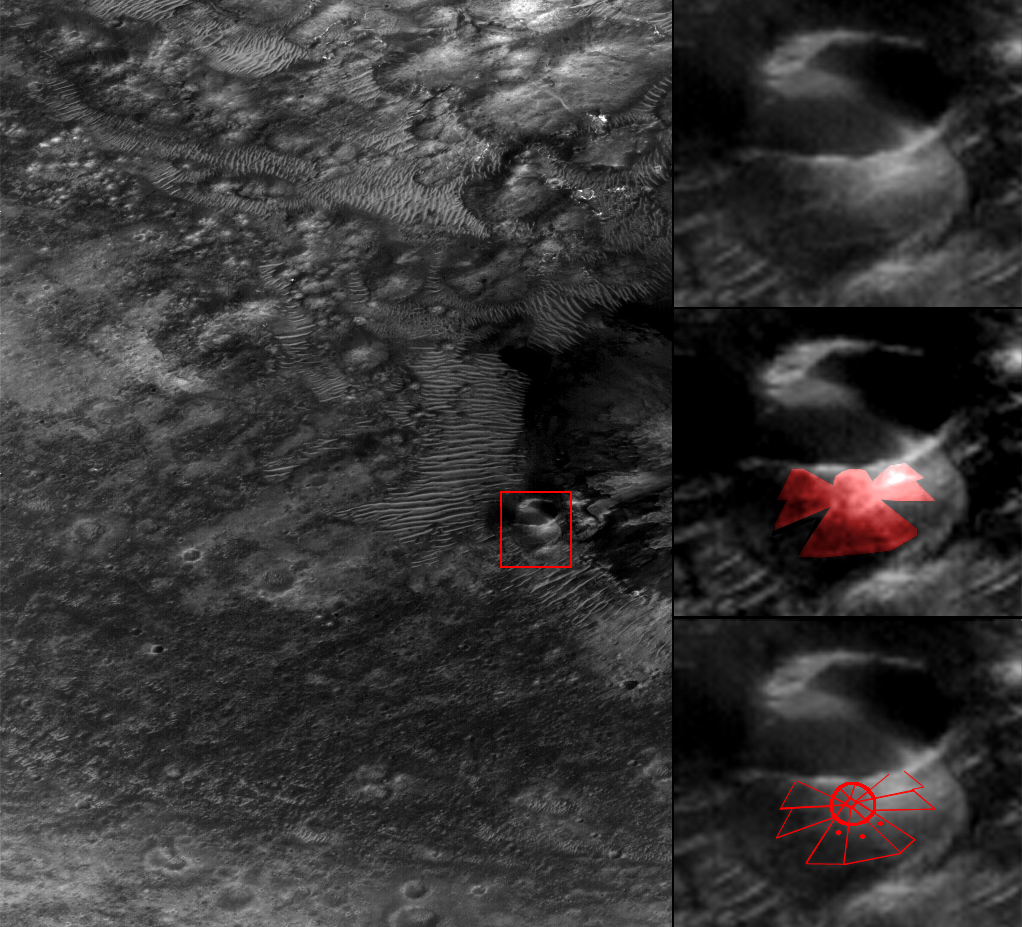
Click on image to enlarge
White lines can be seen which seem to depict a geometric figure. In addition, the magnification
shows a bright ring, which is traversed by the outer lines. Overall, this one appears to be a
very symmetrical figure. Based on a contrast-enhanced image for better orientation, the contours of this
geometrical figure were subsequently retraced (in red color). The resulting outcome can be described as strange.
The interaction of symmetry and lines appears to be a prominent feature of this seemingly abstract figure.
Perhaps it depicts a symbol or an icon. An icon, which conveys graphical information through simplified
presentation. Thus, the lower segment represents an upwardly tapering figure, that the association
of a pyramid. On the each sides are fan-like formations or something that resembles a pair of wings,
which could provide the element of "flying". The center of the figure represents a circle or a ring, which is the
intersection for all the lines and in this way it forms a kind of cross. It's also the tip of the pyramid and
with the ring it conveys the impression of an aureola. Overall, this style is very technical and modern.
Since this figure probably has a particular meaning, it is extremely important for further research
to reproduce the exact shape. The following image sections show the procedural method to breakdown the correct shaping.
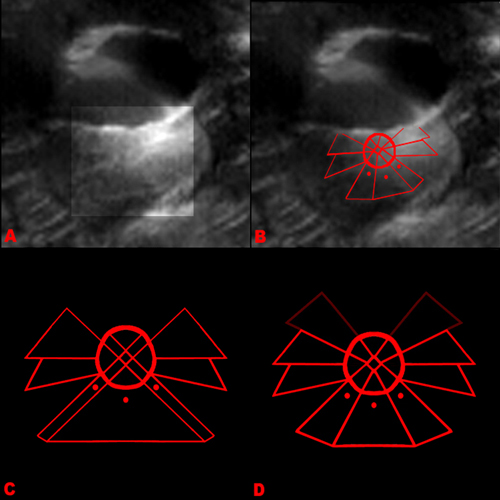
Click on image to enlarge
Section A shows once again the entire ramp construction, which is located on the side of the figure.
In one area contrast and brightness levels were increased in order to emphasize the lines.
Section B is the interpretation of the alignment, which was highlighted by manual tracing in red.
we noticed that the lines break off at the upper edge. This gives the impression that the upper outer range of the ramp is
curved inward. As a result, not the complete view on the figure is given. Maybe the figure offers
further lines which aren't in the viewing area of this photo.
Section C is the attempt to customize the symbol from scratch. The lines which are running into each other within
the ring were applied parallel to each other to created a strictly symmetrical cross pattern. However, this line arrangement causes
that the involved "wings" do not possess the same size ratios anymore. Also, the pyramidal surface below
the ring is severely affected. The sides of the "pyramid" are extremely narrow, while the front part appears to be very protuding.
Compared to the original image in the previous two sections clear differences are visible.
Section D shows how the whole figure is represented, if the lines inside the ring do not run parallel to each other,
but move progressively narrower from the outside toward the center. This also causes that the adjacent wing structures
have the same proportion now. Also, the pyramid construction is now in the perspective of a uniform figure. There remain
two "open" lines in the upper part of the ring. Possibly there is another "wing" pair, which would round off the picture.
But this remains speculative and is therefore added dark-colored in this first draft.
|
Is this strange figure a reference to the hollow mountain or should it rather be understood as a kind of logo? Mediates
the logo a more general meaning, like a company logo?
Quite different than the markings above the ATLAS driveway, the strangeness of the symbol indicates, in this case, a more
extraterrestrial origin. Whatever this symbol represents, it could provide the key to clarify the origin of the actual builder
of the plant complex in Aram Chaos. In this connection it should be also checked whether
the answering of the question for the origin can also explain, why the above-mentioned mound was adorned with a dragon-like figure.
If no further clarifications can be found on photos and should the breakdown of the symbol also
not be possible, then the findings so far are only indicative for the presence of artificial structures.
Structures, among other large technical installations which are currently in operation
(see " liquid spray "). In addition, this equipment seems surprisingly be used by people.
How else can it be explained, that latin letters can be found above a tunnel entrance on Mars
(see " ATLAS writing")?
|
